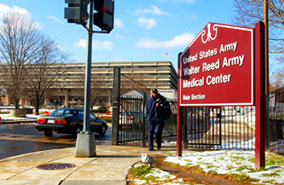- Death raises questions about treatment of veterans (LA Times, 03-22-2007)
- Third Army head rolls in Walter Reed fallout (York Dispatch, 03-13-2007)

WASHINGTON (FinalCall.com) – As they had done after they were shamed when conditions at Abu Ghraib Prison in Iraq were exposed, the U.S. Army’s top commanders apologized publicly March 5 for deplorable conditions at their own flagship military hospital, the Walter Reed Army Medical Center.
“This is the crown jewel, the diamond of the military hospitals. It’s where our most injured soldiers are sent,” Congress woman Eleanor Holmes Norton (D-D.C.) said in an interview. “You don’t close your premiere military hospital in the middle of a war, and in a war on terrorism.”
And yet the conditions at the premiere hospital were so deplorable that the commanding general of the facility was fired, his replacement was fired one day later, and the Secretary of the Army was replaced after a Washington Post newspaper series exposed the neglect there, including rats, roaches, and mold on the walls in apartments in a building used for soldiers in therapy and other outpatients.
“The conditions in the room, in my mind, it was just unforgivable for anybody… it wasn’t fit for anybody to live like that,” Army Specialist Jeremy Duncan testified at Congressional hearings held on the base Mar. 6. “I know most soldiers have just come out of recovery; they have weaker immune systems. Black mold can do damage to people. The holes in the walls… I wouldn’t live there, even if I had to.”
Annette McLeod, the wife of Corporal Wendell McLeod, also testified. “All I’m trying to do is have my life, the life that I had and I know. My life was ripped apart the day that my husband was injured. But having to live through the mess that we lived through at Walter Reed has been the worst thing I ever sacrificed in my life.”
What’s worse, the situation at Walter Reed may be just “the tip of the iceberg” of what is going on at Army medical facilities around the country, according to Rep. Henry Waxman (D-Calif.), Chairman of the House Committee on Oversight and Government Reform.
“The problems uncovered at Walter Reed are systemic,” said Del. Norton, a committee member. “They involve the outpatient care, and the difficulties a soldier has when he’s caught in a system that doesn’t know what they want to do with him. They leave them in a never-never-land; they wander around trying to find out who’s going to help them. It’s a disgrace.
“And, if you did it at Walter Reed, what is happening in Veteran’s hospitals? What is happening in military hospitals all across the United States? Everyone of us are being e-mailed about conditions that nobody, I think, would believe that veterans or returning soldiers should have to bear in outpatient care, so you’re going to see some things begin to happen,” she said.
Vermont Congress member Peter Welch said a major factor in the conditions at Walter Reed might be the result of the privatization of services. Rep. Welch cited a five-year, $120 million contract given to a company called IAP Worldwide Services, which is operated by a former Halliburton executive. That is the same company which botched the delivery of ice to Hurricane Katrina evacuees in 2005. The Corporate Research Project reports that IAP has close ties to the Republican Party.
“It is clear that one of the reasons for ‘Building 18,’ the controversial building that is just a great symbol of what has happened to outpatient care, is that they privatized every job on the Walter Reed base, except for medical care,” said Del. Norton. “They privatized all the skilled employees. They were, by the way, government employees who kept this place going. When you privatize key administrators and infrastructure jobs, what you get is what we’re seeing in Building 18. You get neglect and you get deterioration, which would otherwise not occur.
“I think we owe it to Walter Reed to make sure that privatization does not become a pattern in military hospitals and veterans hospitals across the country. Where you had civilian workers who were doing their job. The privatization did not occur because anybody had a problem with the work they were doing. It occurred because the Army, in the middle of a war, decided that they’d find something else to privatize.
“We’re paying, or at least Walter Reed, the families and the soldiers there are paying for that privatization,” said Del. Norton.
In response to what she described as an “administrative system that is so broken, that short and long term remedies must be applied at the same time,” Del. Norton introduced legislation Mar. 8 that would reverse the planned closing of the Walter Reed base, in order to help stabilize personnel who scatter once they believe a base will close.
Walter Reed is an essential and integral component of the Emergency Preparedness Plan for the nation’s capital, in close proximity to the White House, the Capitol and tourists attractions, and is central to plans to treat mass casualties during a possible terrorist attack in the city or region, the legislation points out.












